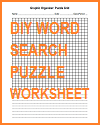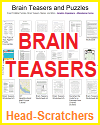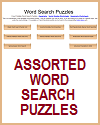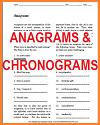English Language Arts students strengthen key literacy skills by engaging with word and language puzzles. Activities like crosswords, word searches, and anagrams expand vocabulary by exposing learners to new terms in context. Cryptograms and syntax puzzles reinforce grammar rules, while riddles and puns develop figurative language understanding. These exercises also sharpen critical thinking as students decode patterns, analyze word structures, and problem-solve creatively.
For reluctant learners, puzzles offer a low-pressure way to interact with language, building confidence through game-like challenges. Teachers can use them to differentiate instruction—visual learners benefit from word jumbles, while logical thinkers thrive on cipher challenges. Ultimately, such puzzles make language exploration active and enjoyable, cementing skills that transfer to reading, writing, and analytical tasks.
|



















































